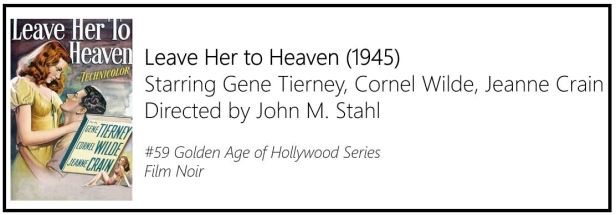

“What’s wrong with Ellen?” her husband Dick, perhaps with a little buyer’s remorse, asks his mother-in-law.
“There’s nothing wrong with Ellen. It’s just that she loves too much.”
Too much indeed.
But I’m getting ahead of the story.
Let’s rewind an hour or so, to the start of Leave Her to Heaven, when the opening scene’s picturesque technicolor setting on a lake is juxtaposed with Alfred Newman’s ominous opening score.
Something very bad has happened to Dick Harland.
The film then takes us to the first meeting between Dick Harland and Ellen Berent. On a train to New Mexico, Dick finds himself staring at the beautiful woman sitting across from him and reading his new book.

When she notices, she stares right back. The intensity and length of the stare is uncomfortable to both Dick and the audience. Eventually, she breaks the stare and transforms into a charming and attractive woman, explaining that she was staring because Dick looks so much like her father.
It’s a perfectly reasonable explanation.
But it’s hard to shake the feeling that something is off with this woman.
By coincidence they are vacationing together in the same home, and he discovers that she is with her mother and adopted sister Ruth to spread her father’s ashes.
The warning signs continue flashing—it’s clear Ellen was unnaturally attached to her father. She alone spreads the ashes with a possessiveness that should make Dick’s blood run cold. Ruth mentions that her their mother adopted her because she was so lonely, despite having a husband and daugher. Ellen stays out all night in the desert after spreading her father’s ashes and her family is unconcerned. Her presence stifles the air in the room.
And she has her sights set on Dick.
If only he’d taken a second look at Ruth, who is not quite as pretty as Ellen but clearly the better choice.
But he doesn’t look, and he’s married to Ellen before he knows what hit him.
Though outwardly happy, Ellen has a sinister aura we can’t quite put our finger on. She comes on strong, then backs away. Though she grew up wealthy, she insists they hire no cook or maid because she wants to be the only one to take care of her new husband.
In another woman, it might be romantic. With Ellen, it feels like a gathering storm.

She’s not calculating in the traditional sense. Not at first, anyway. She hasn’t married him for his money (she clearly has more), doesn’t want him to commit a murder for her, or rob a bank, or any of the other dirty deeds that femme fatales of the 1940s lure their patsies into doing.
She isn’t a street-wise, cold-hearted dame.
She’s insane. Truly, madly, deeply insane.
Why did she marry Dick?
Because he looked like her father.
Why doesn’t she want anyone else around?
Because she wants Dick all to herself.
Whoever said jealousy was a green-eyed monster had obviously met Ellen Berent Harland.

She’s jealous of Dick’s friends, of his work, and most of all, of his sweet-natured, disabled younger brother Danny.
In the film’s signature scene, Ellen is out in a boat on a lake following Danny while he swims. He’s overtaken by a cramp and Ellen realizes this is her opportunity to eliminate her main rival for Dick’s affection. Donned in a fabulous white coat, dark sunglasses, and blood-red lipstick (the impact maximized by glorious technicolor), Ellen calmly watches Danny drown, not moving an inch when he cries out again and again for her help.
Eat your heart out, Phyllis Dietrichson.

Gene Tierney sinks her teeth into the role, infusing Ellen with a malevolence that grows ever more malignant. Murdering Danny unleashes a reign of terror that destroys her marriage, her sister Ruth, husband Dick, and ultimately, herself.
Her revenge against her husband for an imagined affair with her sister is pure madness.
And genius.
Tierney was often underrated as an actress as critics focused on her beauty, but she gave a performance worthy of an Academy Award in Leave Her to Heaven, and indeed, she was nominated. But it was a year of stiff competition and she ultimately lost to Joan Crawford for Mildred Pierce, an Academy decision I endorse.
Leave Her to Heaven is not the best movie I’ve ever seen, nor is it one of my personal favorites. There is no doubt, however, that as Robert Osborne said while introducing it on Turner Classic Movies, it is, “One of those movies that, once seen, is almost impossible to forget.”

Want more? Click here for an index of all posts in this series, as well as source notes and suggested reading.

Maybe it’s the rowing boat, but I’m seeing An American Tragedy/ A Place in the Sun melodrama here…
Yes! But it’s all the creepier here as the one she drowns is a sweet young kid who is no threat to her marriage except her warped mind. I think the Hollywood lesson here is never, ever, ever get in a rowboat……
I think the world would be a better place if these words appeared at the start of every film….